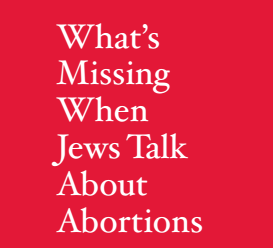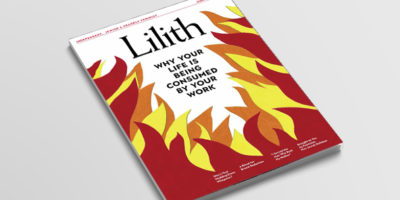
What’s Missing When Jews Talk About Abortions
Here is what we know: American Jews are overwhelmingly pro-choice, and are drawn more to candidates’ stance on social issues, such as abortion, than to how a particular politician feels about Israel.
Jewish support for abortion rights may be rooted in religious belief, also. According to Jewish law, a fetus is not a person. This stands in direct opposition to the Catholic view that life begins at conception. For Jews, until it is capable of sustaining independent life outside the womb (that is, more or less until birth); a fetus is considered part of its mother’s body. The Mishnah states that if a woman’s life is endangered by her pregnancy, “one cuts up the fetus within her womb and extracts it limb by limb, because her life takes precedence over that of the fetus.” If most of the fetus is already out of the birth canal, specifically the head, the birth must be allowed to continue.
There’s a precedent in Jewish law for pro-choice politics. When confronted with largely Christian-based anti-choice rhetoric, we are able to point to our own tradition to support the idea that people should be able to determine if and when to become parents. Perhaps the lack of emphasis on salvation in Jewish thought and practice also has something to do with this, as does the history of Jews being denied freedom of movement and other basic rights. We know what it’s like to be utterly vulnerable, to be controlled by forces beyond ourselves. Therefore, anti-choice legislation is disturbing to us not only as an active assault on our bodies and self-determination, but as a part of our collective memory of oppression.
What else we know: Jews with pro-choice politics support pro-choice organizations. “Planned Parenthood is always on our tzedakah list,” said Rabbi Mary Zamore, Director of the Women’s Rabbinic Network. “We believe in the work they do to provide health care and education about birth control, and in women having control over their bodies.” The National Council of Jewish Women has been organizing around reproductive rights throughout its more than 100 years of existence. The list of Jewish groups doing advocacy on behalf of abortion rights is long and distinguished.
But still, something is missing. While we overwhelmingly support the right to choose, are we talking about our personal relationship to abortion? And are we talking about abortion as a possible outcome when Jews are tested for the many genetic diseases of which Jews are known carriers?
What assumptions do we make about Jews who have abortions?
*****
A March 2017 article by Steph Herold on the website Kveller, “What It’s Like to Be a Jew of Color—and an Abortion Activist—in the Trump Era” highlighted the experience of Jewish women of color who have had abortions and who now work to make sure all people who need abortions can access them. This access includes not only access to a safe and legal procedure itself, but also—think about it—access to the often significant funds needed to meet abortion’s ancillary expenses, like childcare for other kids at home, travel to and from the location (sometimes out of state, depending on the laws governing abortion and its availability in one’s home state), and accommodations while away if there’s a waiting period or if the procedure takes more than one day. Plus making up for lost pay at work, if such a loss is incurred. One of Herold’s interview subjects is Candice Russell, a board member of NARAL Pro-Choice Texas, and a storyteller with We Testify, a project of the National Network of Abortion Funds.
Russell’s abortion story runs counter to the abortion narratives we’re used to hearing. Not only is she Latina and Jewish—an identity which the media, as well as the mainstream Jewish community, often fails to acknowledge—but the Jewish identity of women telling of their abortions is seldom, if ever, part of the narrative. While pro-choice Christian women testifying about their abortions often declare their religious affiliation as part of their politics, in an effort to reclaim Christianity from anti-choicers, we do not often hear the same identity statement from Jews.
We typically hear only about a certain “type” of abortion: a white, college- educated, married woman, likely with one or more children, pregnant with another desperately wanted child, who learns said developing embryo has a devastating fetal anomaly, and so the woman chooses abortion because of it. When Rabbi Emily Langowitz, ordained in May by Hebrew Union College, was writing her rabbinic thesis, “In Our Bodies to Do It: A Jewish Feminist Theology of Reproductive Choice,” she heard many such stories. “For the most part, Jews aren’t encountering people who need abortion funds,” she told Lilith. “As a community, we’re starting to think about access, like we’re starting to think about racism and Islamophobia.”
In a 2012 article for Kveller, Sarah Tuttle-Singer told the story of her own abortion, when she was an undergraduate at Berkeley. Tuttle-Singer was able to pay for her abortion thanks to money given to her by a Jewish women’s philanthropic group on campus. As of this writing, I could locate no fund that currently exists for the explicit purpose of making abortion accessible to Jews, although it is certainly possible that rabbis’ discretionary funds, and grants or loans from organizations such as the Hebrew Free Loan society, have gone to fund abortions, which would be labeled as “health care,” no further details given.
“My sense is that most funding is directed at advocacy to assure access to such medical services,” said Rabbi Marla Feldman, Executive Director of Women of Reform Judaism. “That might include advocacy to guarantee the rights to coverage for certain medical procedures through insurance, benefits, or safety net programs. Many individuals support victims of specific illnesses by supporting associations for that specific condition or the providers of the specific services, rather than through Jewish funds that go directly to individual Jewish victims.”
Still, it is sobering that abortion funding is being left out of Jewish conversations.
Rabbi Langowitz noted that in her rabbinical school classes on marital counseling, rabbis-in-training were urged to tell Jewish couples to undergo testing before having children, to learn if they are carriers of any of 19 Jewish genetic diseases, but the possibility of abortion resulting from unfavorable test results was never mentioned. “So what is genetic testing for?” wondered Langowitz, pointing out that materials put out by organizations such as JScreen Genetic Screening also do not address the choice to abort a fetus with a genetic disease.
Abortion stigma is at the heart of every belief we have about abortion, and we can’t underestimate how it plays in the conversations we have—or do not have—about abortion in the Jewish community. Despite the evidence that Jews support pro-choice candidates for public office, do we think “good” Jews don’t have abortions? Do we at some level believe abortion is innately bad? Do we avoid talking about abortion because we connect it with women who are “irresponsible”? Abortions are part of the reproductive lives of all Jews, whether or not we are telling the stories.
At the conclusion of Langowitz’s thesis, she urges the Jewish community to create language around abortion that is affirming, non-judgmental, and inclusive, so that we can genuinely manifest the Jewish values of reproductive justice. She frames such an endeavor in terms of a covenant: “where the legacy of reproductive history is recognized as a lasting testament to a covenanted relationship with the Source of the universe. A world in which pregnant people are honored for their divine creative potential and their powers of discernment, where the female body’s generosity is never coerced, where freedom of choice is known to be a religious value.”
Chanel Dubofsky’s writing has been published in Cosmopolitan, Previously. TV, The Billfold, Extra Crispy, and more. She lives in Brooklyn, NY. You can find her on Twitter at @chaneldubofsky.


